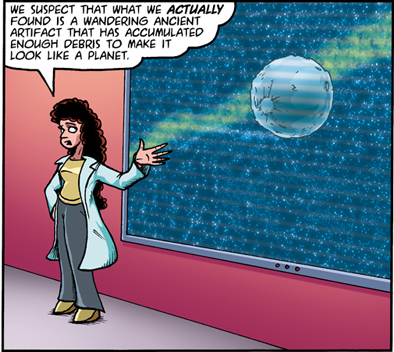Difference between revisions of "Oisrí"
| Line 56: | Line 56: | ||
[[Category:artifact]] | [[Category:artifact]] | ||
[[Category:bk-013]] | [[Category:bk-013]] | ||
Revision as of 04:02, 25 July 2017
Description
Wandering Luna-sized planetoid at the far end of the Carina/Cygnus arm of the Milky Way. Statistics from Augustus Chevre in 2012-02-09 and Wikipedia.
In 2012-03-11 perceived surface gravity is Failed to parse (syntax error): {\displaystyle Gravity \approx 0.93 \times Earth\;\; standard\\\indent \;\;\;\;\;\;\;\;\;\;\;\;\;\;\;\;\; (=\; 0.93 \times 9.81\frac{m}{s^{2}} = 9.12\frac{m}{s^{2}}) } but should be about 16 times Earth standard
Revealed on 2012-03-18 to be an antique annie plant, almost a thousand times larger than any plant that can currently be built. And it has attracted the attention of the UNS.
Once it was all over, Petey's analysis was that it is a machine for creating dark matter creatures (Pa'anuri) 2012-12-30
History
Coming Soon
Notable Residents and Expatriates
include component="pageList" hideInternal="true" tag="Oisri, characters" limit="10"
Affiliations & Relationships
Coming Soon
Appearances
First appearance
First seen (but not named) 2011-12-30
Other notable appearances
[Other times when this location has played a significant part in the story.]
Author's Note
Oisri is Irish/Gaelic for "Oyster."
Speculation
[Insert uncertain and speculative facts about the place.]




